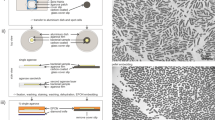Play all audios:

ABSTRACT IT has been reported1,2 that various Gram-positive micro-organisms may be converted into Gram-negative cytoskeletons by extraction with 2 per cent sodium cholate at 60° C. The
extract from _Clostridium welchii_, for example, contained mainly magnesium ribonucleate, deoxyribonucleic acid and polysaccharide, while the extract from _Saccharomyces cerevisiæ_ was
composed chiefly of polysaccharide and magnesium ribonucleate. Cytoskeletons so rendered Gram-negative could be reconverted to Gram-positive forms by treatment under reducing conditions with
the cholate extract. The essential component in this replating process was magnesium ribonucleate, and it was shown that magnesium ribonucleate from a variety of sources could be replated
on to reduced cytoskeletons of yeast or _Cl. welchii_. When Gram-positive cells were converted into Gram-negative forms by autolysis, the resulting cytoskeletons could not be replated by
magnesium ribonucleate. Short autolytic processes were found to result in the liberation into solution of an essentially intact magnesium ribonucleoprotein which possessed the staining
properties of the Gram-positive cells themselves. The nucleoprotein could be dissociated into magnesium ribonucleate and a protein—neither of which separately possessed the property of being
able to retain the Gram stain, but which, upon recombination under reducing conditions, formed a complex which stained intensely Gram-positive. In the light of these results, it was
suggested that an essential part of the Gram complex is a magnesium ribonucleoprotein. Numerous confirmations of these claims and techniques have been received3,4,5 from workers in various
parts of the world, though recently Mitchell and Moyle6 prefer to regard the essential part of the Gram complex as a hypothetical “_X/P_ factor”. However, inasmuch as the results of Mitchell
and Moyle show no content of this as yet ill-defined _X/P_ factor in _Cl. welchii_, which is one of the most intensely staining Gram-positive organisms, we find it difficult to accept their
assumption that this factor is an essential component of the Gram complex. Access through your institution Buy or subscribe This is a preview of subscription content, access via your
institution ACCESS OPTIONS Access through your institution Subscribe to this journal Receive 51 print issues and online access $199.00 per year only $3.90 per issue Learn more Buy this
article * Purchase on SpringerLink * Instant access to full article PDF Buy now Prices may be subject to local taxes which are calculated during checkout ADDITIONAL ACCESS OPTIONS: * Log in
* Learn about institutional subscriptions * Read our FAQs * Contact customer support SIMILAR CONTENT BEING VIEWED BY OTHERS A FLAT EMBEDDING METHOD FOR TRANSMISSION ELECTRON MICROSCOPY
REVEALS AN UNKNOWN MECHANISM OF TETRACYCLINE Article Open access 08 March 2021 INTRACELLULAR ION CONCENTRATIONS AND CATION-DEPENDENT REMODELLING OF BACTERIAL MREB ASSEMBLIES Article Open
access 20 July 2020 ACTIN CYTOSKELETON AND COMPLEX CELL ARCHITECTURE IN AN ASGARD ARCHAEON Article Open access 21 December 2022 REFERENCES * Henry, H., and Stacey, M., _Proc. Roy. Soc._, B.,
133, 391 (1946). Article ADS CAS Google Scholar * Henry, H., Stacey, M., and Teece, E. G., _Nature_, 156, 720 (1945). Article ADS CAS Google Scholar * Bartholomew, J. W., and
Umbreit, W. W., _J. Bact._, 48, 567 (1944). CAS PubMed Google Scholar * Bartholomew, J. W., _J. Bact._, 51, 584 (1946). CAS PubMed Google Scholar * Michelazzi, L., and others (private
communication). * Mitchell, P., and Moyle, J., _Nature_, 166, 218 (1950). Article ADS CAS Google Scholar * Webb, M., _J. Gen. Microbiol._, 2, 260 (1948). Article CAS Google Scholar
Download references AUTHOR INFORMATION Author notes * A. S. JONES: Beit Memorial Research Fellow. AUTHORS AND AFFILIATIONS * Chemistry Department, University, Birmingham, 15 A. S. JONES, P.
W. MUGGLETON & M. STACEY Authors * A. S. JONES View author publications You can also search for this author inPubMed Google Scholar * P. W. MUGGLETON View author publications You can
also search for this author inPubMed Google Scholar * M. STACEY View author publications You can also search for this author inPubMed Google Scholar RIGHTS AND PERMISSIONS Reprints and
permissions ABOUT THIS ARTICLE CITE THIS ARTICLE JONES, A., MUGGLETON, P. & STACEY, M. The Gram Complex in _Clostridium welchii_. _Nature_ 166, 650–651 (1950).
https://doi.org/10.1038/166650a0 Download citation * Issue Date: 14 October 1950 * DOI: https://doi.org/10.1038/166650a0 SHARE THIS ARTICLE Anyone you share the following link with will be
able to read this content: Get shareable link Sorry, a shareable link is not currently available for this article. Copy to clipboard Provided by the Springer Nature SharedIt content-sharing
initiative
